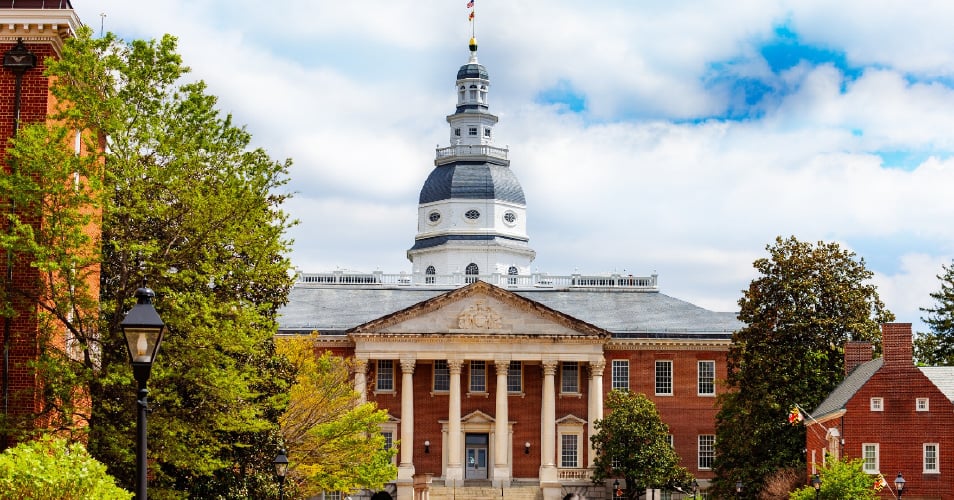State and local officials are evidently feeling very contrary this week, both distinguishing themselves from the federal government shutdown by staying very busy and enacting or considering a dizzying amount of reversals.
Maryland has made a tremendous turnaround, turning a $3 billion shortfall into a surplus through largely progressive revenue improvements. Oregon is one signature away from reversing a long decline in transportation funding through a package of revenue raisers. Alaskans who thought they had achieved a commonsense corporate tax change to better fund schools instead saw that bill vetoed by Gov. Mike Dunleavy. Nebraskans who thought they made their stance on public dollars for private schools clear at the ballot box saw those wishes “cannonballed” by Gov. Jim Pillen.
And at the local level: Boston officials are considering asking the state to undo a property tax limit that constrains local budgets; Pittsburgh’s “jock tax” was struck down; and Kansas City, Missouri, joined Kansas City, Kansas, in backing out of their truce on tax subsidies.
Major State Tax Proposals and Developments
- The MARYLAND Board of Revenue Estimates announced an improved financial situation in the state. Earlier this year, the state faced a $3 billion deficit but now has a surplus due to new taxes and fees that were signed into law this past legislative session. – MILES TRINIDAD
- MASSSACHUSETTS estimated that the new federal tax law will reduce state revenues by about $650 million, alongside dramatic cuts to federal health care spending and economic upheaval from tariffs. – ELI BYERLY-DUKE
- The OREGON Senate passed a major transportation funding bill to raise $4.3 billion for road maintenance and public transit. The legislation includes increases to the state’s gas tax (from 40 to 46 cents per gallon), increases to vehicle title and registration fees, a doubling of the state’s payroll tax (from 0.1 to 0.2 percent) for the next two years, and requiring electric vehicle drivers to enroll in the state’s road usage charge program. The bill now goes to Gov. Tina Kotek’s desk for final approval. – MILES TRINIDAD
State Roundup
- ALASKA Gov. Mike Dunleavy vetoed a corporate income tax apportionment bill that would have helped fund public education. The state would have joined 36 other states that have approved apportionment standards, but in his veto message, the governor said that any tax measures must be a part of a broader plan to bring state revenues and expenses in line over the long run. Lawmakers could overturn the veto in January if 45 of 60 legislators approve it.
- Low- and middle-income homeowners in Cook County, ILLINOIS could be eligible for a $1,000 payment if the property tax bill on their primary residence has increased at least 50 percent in any year since 2021.
- Municipalities in INDIANA could take a hit to their credit rating – which would impact their ability to finance capital projects and operations – due to recent state legislation to limit property tax growth.
- Two tax credits are under scrutiny in KANSAS after a legislative audit. The High Performance Incentive Program, which encourages businesses to make capital investments, lacked data about the program’s usage. The Kansas Affordable Housing Tax Credit, which offers tax credits for certain building units rented below market price, is under scrutiny due to cost.
- Due to commercial property value declines in downtown Boston, Mayor Michelle Wu has pursued a variety of MASSACHUSETTS state law changes to the property tax in the city. Last week, Mayor Wu indicated to reporters that she would be interested in scrapping the state’s Proposition 2 ½. The law restricts property tax growth and puts strict limits on how municipalities can raise revenues, which leads to disparities between municipalities and school districts.
- The City Council of Kansas City, MISSOURI, officially repealed the subsidy truce with Kansas City, Kansas. Following the states’ battle over subsidies for future Royals and Chiefs stadiums, the city has withdrawn from the entire truce following Missouri’s withdrawal from their agreement with Kansas. Both states argue the stadiums would bring in sales and income tax receipts, though it is still unclear how much either will spend subsidizing either team.
- After NEBRASKA voters strongly rejected efforts to send public tax dollars to private schools in a statewide vote, Gov. Jim Pillen announced he is “cannonballing” a private school voucher program into the state anyway as Nebraska will be one of the first states to opt into a Trump administration program for federal private school contribution tax credits.
- The PENNSYLVANIA Supreme Court struck down Pittsburgh’s “jock tax” as a violation of the state’s uniformity clause. The tax applied the same local income tax rate to non-resident athletes as it does to full-time residents. However, the tax only applied to income earned at city-owned facilities and not privately owned facilities. The city will lose approximately $4 million per year and may be forced to refund millions more.
- RHODE ISLAND notably decoupled from the federal treatment of domestic research and experimental expenditures under the new federal tax law. This allows the state to not follow the federal government’s lead on allowing businesses to accelerate expensing of domestic research and other expenditures in 2025. The change also would have allowed small businesses to do so retroactively up to tax year 2022.
- WASHINGTON’s need for progressive revenues has heightened even further as a recent forecast revision shows an additional revenue shortfall of $903 million over four years.
What We’re Reading
- The New York Times reports that “tax the rich” cries are echoing from both sides of the Atlantic as protesters in France mobilize to reinstate a national wealth tax in order to avoid devastating budget cuts.
- The Florida Policy Institute released updated estimates on the cost of eliminating property taxes in Florida. If eliminated, local governments would need to raise over $50 billion to replace lost revenue.
- The Chicago-focused Institute for the Public Good released a report urging city leaders to bring back the Head Tax, a corporate tax eliminated in 2014. They estimate a modernized head tax could bring the city over $400 million a year, which would be used to help close a budget gap of over $1 billion.
- Wired breaks down Louisiana’s new data center deal with Meta, showing that state officials agreed to grant Meta lucrative tax breaks without any obligation to hire locally or create full-time jobs.
- The think tank Truth in Accounting released its 2025 Financial State of the States report and found that half of the states do not have enough money to pay their bills. When liability was offset against assets available, the states had $765 billion in unfunded debt for the 2024 fiscal year.
If you like what you are seeing in the Rundown (or even if you don’t) please send any feedback or tips for future posts to Aidan Davis at [email protected]. Click here to sign up to receive the Rundown via email.





